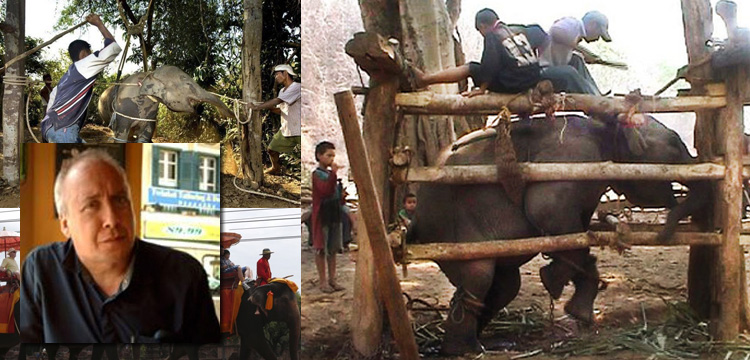The Crush – How sadism is used to domesticate elephants in parts of Thailand by Joachim Matschoss, playwright, poet, Theatre-maker and intrepid traveler.
Photograph of elephant in ‘crush’ www.occupyforanimals.net
Very recently I spend some time in and around Chiang Mai, a city in the northern part of Thailand. While traveling in the remote highlands, west of the village of Mae Jaem, I heard a sound that is still ringing in my ears. A young elephant screamed as young men stabbed nails into her ears and feet. The animal was tied up and immobilized in a small, wooden cage. Her cries were the only sounds I could hear in this otherwise quiet countryside.
The cage is called a “training crush.” It’s the centrepiece of a centuries-old ritual in northern Thailand designed to domesticate young elephants. In addition to beatings, elephant-handlers use sleep-deprivation, hunger, and thirst to “break” the elephants’ spirit and make them submissive to their owners. “It’s a ritual that exists, in varying forms and degrees of cruelty, in virtually every country in Asia that has domesticated elephants,” explained Richard Lair, an American expatriate and international relations officer for Thailand’s Elephant Conservation Center in Lampang. Lair has studied domesticated elephants for more than 20 years and is author of the UN report Gone Astray: The Care and Management of the Asian Elephant in Domesticity.
It seemed that there is the belief it to be important to control the animal one needs to make the elephant feel fear and pain. There are many who are outspoken critics of the ‘crush’ and whose business activities around elephants seems to be focused on care and not exploitation but there are still others who exploit. There is the belief in Thailand that elephants helped build their nation. For centuries they were used to transport, breakdown buildings, even used in war. The elephants became cultural icons and in some way symbols of Thailand’s king’s divine right to rule. People ‘used them’ as good luck-charms, even religious icons. The status of the animal has not influenced the fact that they are now near-extinction in Thailand. The World Conservation Union, based in Gland, Switzerland, lists the Asian elephant as endangered.
A century ago, there were 100,000 elephants in Thailand. That number has fallen 95 percent, primarily due to loss of habitat. Of a few thousand elephants left, about half are domestic, according to information I have received from a local. There is still for too little done to really protect them.
Thai law is quite ambivalent in regards to the animals as domestic elephants are considered livestock and therefore under Thai law, they’re no different from buffalo or cattle. Small fines, rarely enforced, are the only penalties for abusing livestock. Most domestic elephants now work in tourism. Worldwide fascination with these giants fuels a thriving industry. Tourists from all over the world pay good money to take elephant rides in the forest, or watch them perform in shows. But the process of domesticating these animals is something few outsiders see. For example, elephants in the crush are taught to raise their feet on command so owners can easily move them. Men give orders enforced by stabbing at the animals’ legs with sticks that have nails on the end. Mistakes are punished with beatings.
Elephants are typically covered in bloody wounds and rope burns when released from the crush after three to six days. They are quickly tied up again; the training continues for weeks.
Are there alternatives? A new training-method should depend on rewards, not punishment, a local told me.
But ‘the crush’ thrives in isolated villages where narrow dirt roads are the only connection to the outside world. Few outsiders venture into these remote areas. Isolation is what allowed the crush to continue unchanged for hundreds of years, and protects it still.
© Joachim Matschoss
https://youtu.be/L0xSuUXRHnE
————–
Joachim Matschoss was born in Germany and now lives in Melbourne/Australia. He is a playwright, poet and Theatre-maker. His Theatre Company, ‘Backyard Theatre Ensemble (BYTE)’ presents diverse pieces of theatre all across Melbourne/ Australia and internationally, both Youth Arts and for adults.
Joachim has created theatre in Australia, New Zealand, United Kingdom, India, Uzbekistan, Malaysia, Indonesia, HongKong, Hungary, Taiwan, Switzerland and China.
Joachim is fascinated by creating work from scratch, starting with a thought, image, or a piece of music. It is inevitable that a piece of theatre will grow, will happen. There is always a story to tell, to listen to. Joachim is less interested in seeing a piece of theatre grow like a flower, but more so like a weed, something raw, something with cracks, and something that is challenging both the performer and the audience member. Most recently Joachim has worked with street kids and underprivileged youth in Jakarta/Indonesia. He was involved in a performance project ‘Protect the persecuted’ in Geneva and a project about racial harmony in Germany. Joachim’s poetry is published in Australia, Germany, the United Kingdom and the USA.
Joachim published a travel journal in Australia (Away with me) and a novel in the USA (Dead River Oaks).
For more information go to the website: www.byteensemble.com


